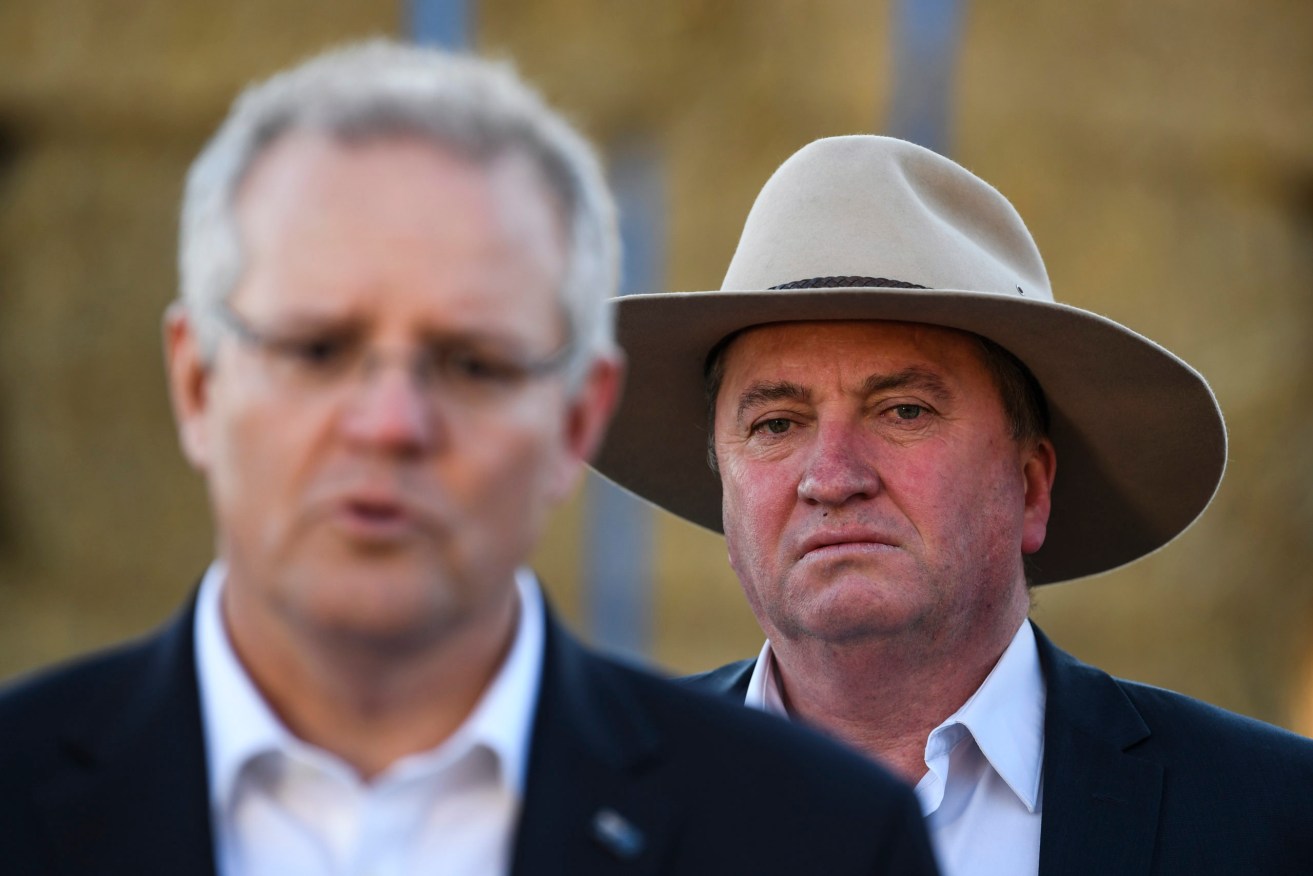High stakes politics of Morrison climate policy
The Prime Minister has to win over his coalition partner before committing Australia to net zero emissions by 2050, writes Michelle Grattan.

Prime Minister Scott Morrison with deputy PM and Nationals leader Barnaby Joyce. Photo: AAP/Lukas Coch
The government’s leadership group is due to consider plans for a revised climate policy this week, as Scott Morrison goes all out to land a deal the Nationals will accept.
The stakes are very high for both Morrison and Deputy Prime Minister Barnaby Joyce.
Morrison needs to be able to commit to net zero emissions by 2050 and to improve the government’s medium term ambition, if he is to keep faith with the expectations of Australia’s allies, the United States and Britain.
Joyce has to get a package that is sufficiently acceptable to a majority of the Nationals so that his party room doesn’t feel their restored leader has sold them out.
Morrison and Joyce have been in discussions for some time but with the Glasgow climate conference looming early next month, reaching finality is now becoming urgent.
The leadership group includes, besides the PM and Joyce, treasurer Josh Frydenberg, finance minister Simon Birmingham, attorney-general Michaelia Cash, defence minister Peter Dutton, deputy Nationals leader and agriculture minister David Littleproud, Nationals Senate leader and regionalisation minister Bridget McKenzie, and health minister Greg Hunt.
After the leadership group considers it, the policy will go to the wider cabinet.
The Nationals will meet Monday virtually, but will not have a substantive policy to discuss. They have indicated they want to consider the plan in a face-to-face meeting. The first opportunity for that is when parliament meets next week. The policy would also go to the joint parties room.
Morrison will announce the policy before the Glasgow meeting.
Assuming he lands a satisfactory deal, he is still unclear about whether he will go to Glasgow, and has not sounded enthusiastic. He has pointed to onerous quarantine requirements as a disincentive but the new NSW treasurer Matt Kean indicated to Sky NSW would smooth that problem if need be.
There are other disincentives to the PM’s trip, which would also include the G20 meeting. One is his need to concentrate on domestic politics in the final part of the year.
Another is the prospect of awkward moments on the trip. French president Emmanuel Macron will be at the G20, and it is not certain how an encounter would go, given the tension between the two countries over the cancelled submarines contract. Former PM Malcolm Turnbull will be at Glasgow, which could make for another difficult encounter.
On the other hand, the Glasgow conference is a major international occasion and Morrison would be criticised for not attending.
The Business Council of Australia bought into the climate debate at the weekend, backing net zero for 2050 and a big lift in the 2030 target – to a 46-50% economy-wide range against 2005 levels. The present target is for a reduction of 26-28%.
However the BCA – which represents Australia’s largest companies – immediately came in for some flak.
Some critics homed in on its change of position, because it had derided Labor’s proposal for a 45% reduction target before the last election. The BCA said this would be economy wrecking.
Energy minister Angus Taylor was somewhat dismissive of the BCA report saying it made “a number of recommendations that have concerning impacts for households and businesses”.
For instance, “the BCA’s recommendation to expand the Safeguard Mechanism and bring down baselines would force companies to reduce their emissions, regardless of whether economically viable technologies are available, risking competitiveness and jobs – this is a carbon tax”.
Joyce, speaking to the Western Australian Nationals conference, said: “BCA and those who you represent — you are now on the hook for what you state, the cost is now yours.
“Future governments will say that you asked for this, and if it’s a flop, if it’s a disaster, as the energy crisis now is in the UK, Europe and China, you have to pay to fix it.”
Michelle Grattan, Professorial Fellow, University of Canberra
This article is republished from The Conversation under a Creative Commons license. Read the original article.
![]()




